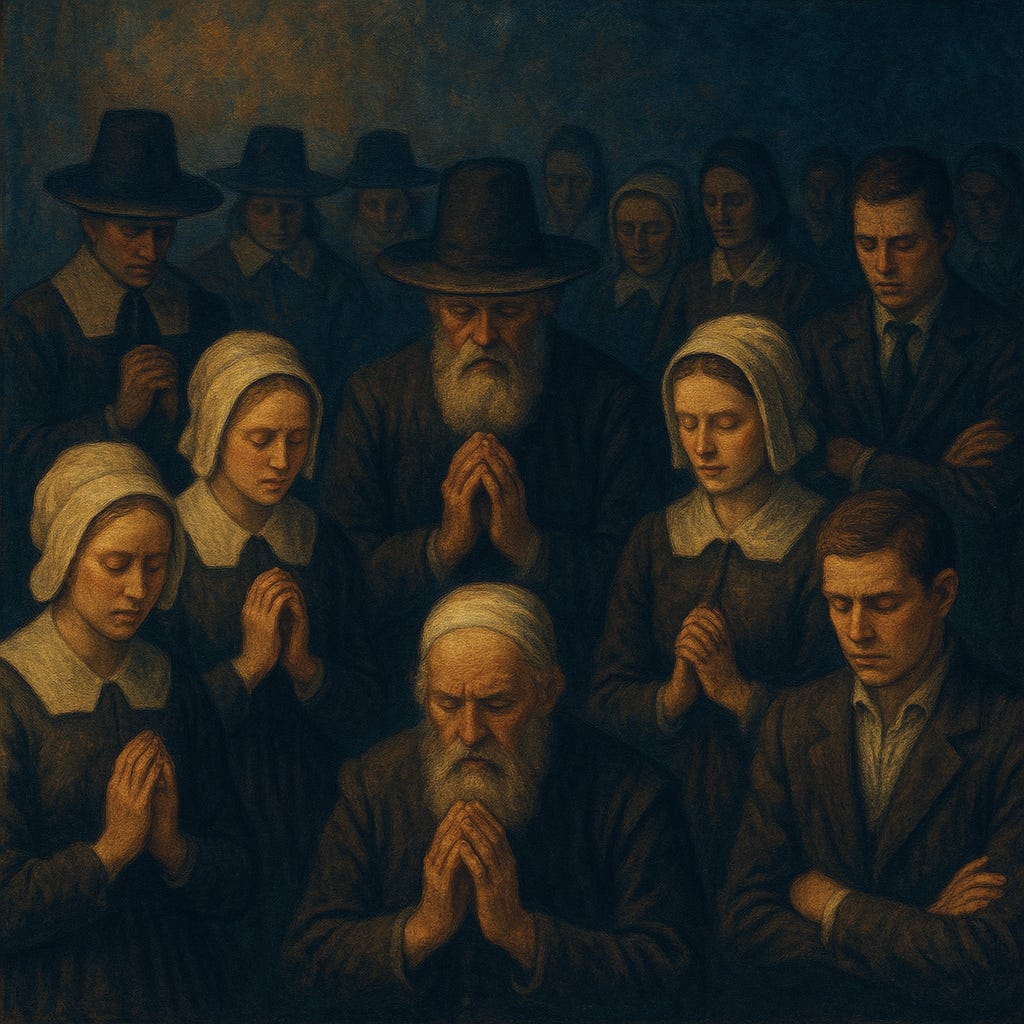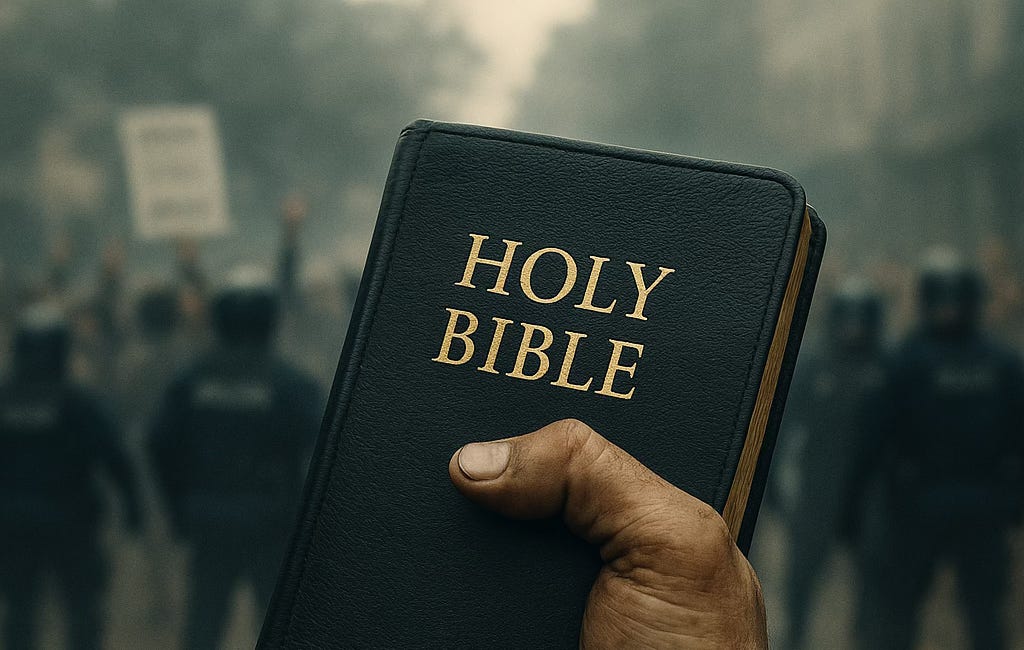The Moral Republic: The Shape of the Right: An Autopsy of American Conservatism-A Ten Part Series, Nr. 1
How Puritanism Outlived God
“They fled persecution and then founded a colony of judges.”—Anonymous
This essay is part of The Shape of the Right: An Autopsy of American Conservatism, a ten-part exploration of the ideas, myths, and moral compulsions that shaped the American Right. I’m not here to sneer or to support it, but to understand how a movement that began with sermons and self-discipline grew into a politics of grievance and spectacle. Each essay stands on its own, but together they form an autopsy, not of a party, but of a moral psychology that still thinks it’s the soul of the nation.
I’ve started to suspect that America never stopped being a church. We just misplaced the hymnal and decided the sermon could run indefinitely.
We still confess. We still condemn. We still gather in digital pews to perform moral certainty for one another, as if the old meetinghouse were reborn in pixels and comment threads. Only now the preacher’s wearing a microphone and the congregation’s scrolling through.
Sometimes I think the Puritans would be proud. They came here to build a city on a hill, and we managed to turn the entire continent into one vast pulpit. Every election, every scandal, every argument about who deserves what feels like another sermon about salvation.
We say we left religion behind, but the rituals stayed. The altar just changed shapes.
The Ghost Still Praying
Maybe the most honest thing I can say about us is this: we lost our God but kept the guilt.
You can see it in the way we talk about morality. We may not speak of sin anymore, but we speak of corruption. We may not warn of hellfire, but we warn of moral decay. We still divide the world into the saved and the damned, only now the categories come with hashtags.
We call it accountability. They called it piety. The melody hasn’t changed. Only the instruments have.
I sometimes imagine old John Winthrop, standing at the edge of Boston Harbor, telling his followers they’d be a city upon a hill. The eyes of the world upon them. And I think, well, he got that part right. The eyes of the world are still on us. Only now it’s a livestream.
We still want to be chosen. We still crave the feeling of being right in a world that feels wrong. That might be the oldest American prayer there is, Lord, let me be on the good side of history.
The Inheritance
The Puritans didn’t come here to build a democracy. They came to build proof.
Their theology was simple and terrifying: everyone’s depraved, most are damned, and you’ll never really know if you’re among the elect. The only clue is whether your life looks sufficiently righteous. So they worked, prayed, and disciplined themselves until virtue became a performance art.
I don’t judge them for it. Fear was their fuel. The world was savage and cold. Their crops failed, their children died, their faith was the only stable thing they had. But fear leaves fingerprints, and those fingerprints still smudge everything we touch.
They believed that grace could be detected through good works. We believe success can be detected through productivity. They saw God’s favor in a thriving harvest; we see it in a well-curated résumé. The theology shifted, but the anxiety stayed the same.
If you’ve ever looked at someone richer than you and wondered what moral quality they possessed that you lacked, congratulations, you’ve just reenacted Calvinism with better lighting.
The City on the Hill
Winthrop’s sermon still echoes through every patriotic speech we give. The “city upon a hill” began as a plea for humility, live rightly, because the world is watching. But over time, it became the anthem of arrogance. We stopped worrying about disappointing God and started congratulating ourselves for being Him.
That moral anxiety turned into national destiny. We built a myth of purity so luminous that it blinded us to our own contradictions. We called it exceptionalism. We still do.
It’s the same impulse, only bigger and better funded. The belief that we’re uniquely moral, uniquely free, uniquely chosen. Every empire tells itself that story. Ours just learned to sing it in English.
What fascinates me is how this story keeps us terrified of impurity. Every generation invents new devils to cast out. Immigrants. Liberals. Elites. Communists. Witches. Sometimes we forget which century we’re in. We’re a country perpetually afraid of losing innocence we never actually had.
The Godless Puritan
The Puritans have been dead for centuries, but their moral wiring’s still running the place. We just removed the voltage of belief and left the circuitry intact.
We stopped asking “Is this righteous?” and started asking “Is this appropriate?” or “Is this on brand?” But we’re still measuring, still policing, still purging. We still think decency can be quantified and salvation can be proven by metrics.
It’s as if we took the moral architecture of a theocracy and repurposed it for self-help.
Even the Left, in its own moral fervor, sometimes slips into the same rhythm. Outrage as virtue. Shame as sacrament. Atonement through apology posts. Different choir, same hymn.
We’re all Puritans now, just without the theology to hold the fear together. Which may explain why everyone’s so twitchy. A society that demands repentance but has no concept of grace eventually eats itself.
The Family as Church
When the church lost power, the family absorbed it.
The Puritans treated the home as a moral frontier. The father was pastor, the mother was moral custodian, the children were half-saved apprentices to discipline. The structure was simple: order inside the household meant order inside the world.
Centuries later, the Right still preaches that sermon. “Family values” isn’t about love or support; it’s about hierarchy. It’s the last little kingdom where someone still gets to play God.
When conservatives mourn the collapse of the traditional family, what they’re really mourning is the collapse of that moral order. They miss the comfort of certainty, knowing who’s in charge, who obeys, and who gets blamed when purity slips.
And honestly, who doesn’t long for a simpler moral map sometimes? It’s easier to defend the old rules than to live with ambiguity. Easier to police the body than to confront the soul. Easier to protect innocence than to understand it.
The irony, of course, is that the Puritans’ home life was miserable. Fear makes a poor foundation for love. But fear is habit-forming, and moral certainty the most addictive fear of all.
Grace and the Marketplace
It’s strange how a theology built on divine mystery ended up inventing the stock market.
Calvin taught that worldly success could signal divine election. We turned that whisper of grace into a national slogan. Hard work proves virtue. Wealth proves worth. Poverty must be your fault.
That’s not capitalism; that’s catechism with quarterly returns.
You can hear the echoes of the pulpit every time someone says “I pulled myself up by my bootstraps.” That’s not economics. That’s a testimony. It’s the same anxious need to show that you’re chosen, that God, or the market, or history itself, has smiled upon you.
We still worship the productive. We still stigmatize the idle. The Puritans called idleness a sin. We call it laziness. Either way, the punishment’s the same.
I sometimes think the only difference between a sermon and a shareholder meeting is the catering.
The Chosen Nation
Once the theology of chosenness escaped the pulpit, it became national foreign policy.
We began seeing ourselves as global redeemers, destined to cleanse the world of evil. Manifest Destiny was the first crusade. The Cold War was another. Each new generation of leaders inherited the conviction that America’s mission was to purify, to enlighten, to save.
We love to say we’re defending freedom. What we’re really defending is moral self-image.
Every bomb we drop comes with a note attached: Forgive us, Lord, but they needed saving.
That’s the ancient rhythm of the chosen people. It’s not enough to be good. You must be good for everyone else. You must export virtue at gunpoint.
And if the world resents you for it, well, that’s persecution, which only proves you were right all along.
The Moral Republic
Here’s the cruel twist of it all.
We built a moral republic that no longer believes in redemption. A nation that insists on moral order but has no language of grace.
Every public debate feels like a sermon without an ending. Every scandal becomes a morality play in which someone must be cast out so the congregation can feel pure again. We keep reenacting the Salem trials with better lighting and a bigger audience.
We talk about freedom, but what we really want is absolution. We want someone to tell us we’re still good. That our sins are survivable. That being American still means being righteous.
But no one’s left to give that blessing.
And so the sermon goes on, louder and harsher, hoping volume will substitute for faith.
The Endless Sermon
When I scroll through the day’s outrage, it feels like sitting through a Puritan revival that never ends. Everyone’s confessing, repenting, denouncing.
We’ve turned morality into performance. The only unforgivable sin is fatigue. You must stay vigilant. You must stay angry. You must stay pure.
We call it civic engagement. They called it sanctification. The spirit’s the same.
What’s missing is mercy. The Puritans at least had a God to forgive them. We only have each other, and we’re terrible at it.
Sometimes I think the real American tragedy isn’t that we’re hypocrites. It’s that we’re sincere. We genuinely want to be good, we just don’t know how to stop punishing ourselves for not being perfect.
What Survived the Sermon
I try not to sneer at the Puritans. They were frightened people in a dangerous world trying to stay good. They failed often and dramatically, but at least they cared about goodness.
Their descendants built a republic and swapped pulpits for politics, but the hunger for purity never left. It just learned new songs.
We still crave the clean line between right and wrong. We still believe history’s a morality play with heroes and villains, the saved and the damned. We still think we can earn salvation, only now it’s through policy, not prayer.
What haunts me is how lonely that makes us. We built a civilization on the fear of being unworthy. We built an empire on the hope that someone was watching. And when no one was, we kept pretending anyway.
Closing Reflection
If you listen carefully, you can still hear the old preacher pacing the aisles of our national conscience. He’s tapping the microphone, waiting for us to quiet down, and asking the only question that ever mattered to him.
Are you pure yet?
We never answer. We just keep working harder.
We’re a moral republic that forgot who it was praying to. We lost the God but kept the rules. We traded grace for credit scores, confession for content moderation, heaven for high moral ground.
Maybe what we need now isn’t purity at all. Maybe it’s mercy. The kind that sees our mess and says, “You’re human. That’s enough.”
Because if there’s any lesson left in the Puritan ghost story, it’s this: a people that forgets how to forgive itself eventually burns everything trying to stay clean.
And we’ve already started to smell the smoke.
Next week in the series: The Frontier Mind: The Myth of Self-Reliance in a Subsidized Nation
Please Support the Work
This work is free for all because light should never be gated. If these words feel like a lantern in your hands, you can help keep it burning. Your support makes sure the flame doesn’t go out. You can make a monthly or yearly donation below.
Dino’s Homily and Poetry Shop here
Light Against Empire - The Podcast here
Further Reading:







this writing really resonates for me. Thank you.
Dino, I admire your poetic prose delivering pounds of insight in ounces of words. I also appreciate your resonant reading out loud versus leaving it to a robotic voice synthesis.